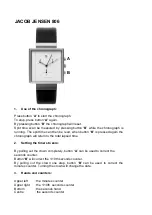
Getting Started
22
•
The accuracy of the optical heart rate sensor may be diminished depending on
measurement conditions and surroundings.
•
Use the HR feature only for measuring your heart rate.
•
Cold ambient temperatures may affect your measurement; during winter or cold
weather, keep yourself warm when checking your heart rate.
•
Smoking or consuming alcohol before taking measurements may cause your heart
rate to be different from your normal heart rate.
•
Do not talk, yawn, or breathe deeply while taking heart rate measurements. Doing
so may cause your heart rate to be recorded inaccurately.
•
The signal may be affected by your skin brightness, blood flow under your skin,
and the cleanliness of the sensor area. In addition, if your heart rate is extremely
high or low, measurements may be inaccurate.
•
Users with thin wrists may receive inaccurate heart rate measurements when
the device is loose, causing the light to be reflected unevenly. If heart rate
measurement is not working properly, adjust the position of the device’s optical
heart rate sensor to the right, left, up, or down on your wrist, or wear the device on
your inner arm so that the sensor is in contact with your skin.
•
If the optical heart rate sensor is dirty, wipe the sensor and try again. Obstructions
between the device’s band and your wrist, such as dirt or other objects may
prevent the light from reflecting evenly. Please make sure you remove such
obstructions before use.
•
To measure your heart rate more accurately with the Galaxy Watch3, use the Ridge
sport band. The Ridge sport band is sold separately.
















































